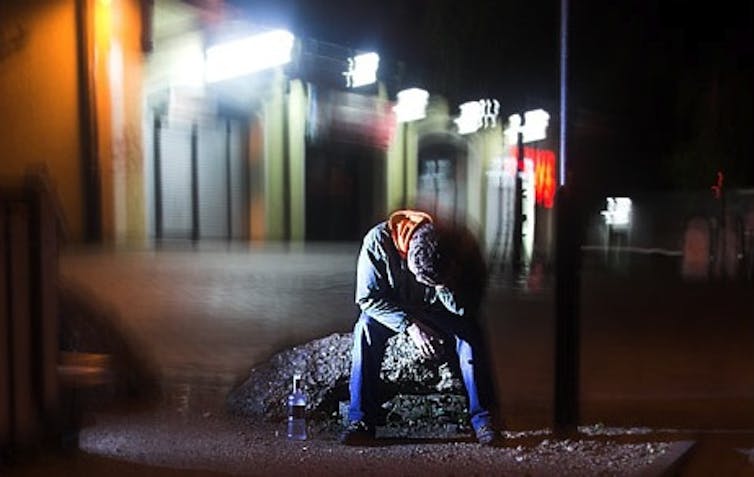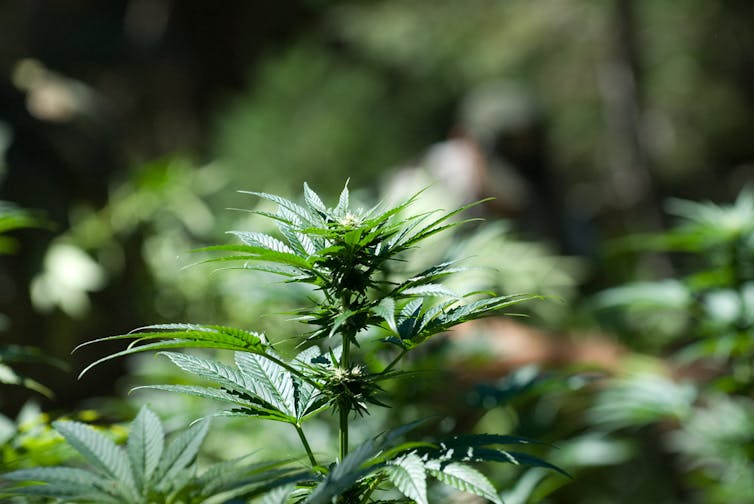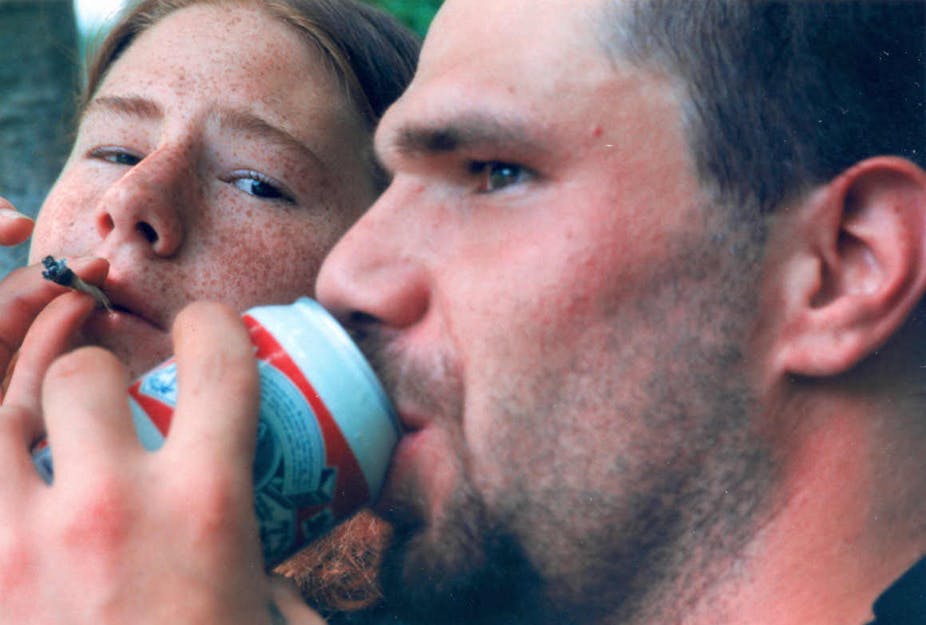Alcohol is a serious problem in Australia, both on the weekend streets and more widely behind the closed doors. It’s time we started a conversation about what can be done to help, and we should consider if legalising cannabis is a viable option.
Here’s a snapshot of what alcohol is doing in just one state. Among Victorians generally and young people especially, casualties from alcohol are not only high but have been rising.
In 2009, the most recent year in which the government has collected the data, 42% of Victorians aged 16 to 24 had drunk 20 or more drinks in a day sometime in the last year. That’s 60% more than had done this in 2002.
Among the 15% who had done this in 2009 at least once a month, 40% had been injured after drinking, 28% said they had created a public disturbance or nuisance, 19% had damaged property, and 13% had physically abused someone.
Statistics like these suggest that our laws on psychoactive substances may have channelled young people’s socialising and experimentation in a very harmful direction.
It’s time to rebalance laws, not only to cut down how much we are drinking, but also to reconsider whether young experimenters, and those around them, might be better off if the experiments were with another drug, such as cannabis.
But there are strong cultural barriers to starting a public conversation about this. Earlier this month, a reporter found a YouTube clip, apparently posted in May, from a 2012 European meeting where I had been asked to make an argument why young people would be better off on cannabis than on alcohol.
There was no “news peg” for the story, nothing more immediate than the old video clip. But the resulting Herald-Sun interview created quite a media splash, reaching as far as Denmark.
Different approaches
It’s stating the obvious to say that cannabis and alcohol are treated very differently in Australian society.
Cannabis is illegal everywhere, even though it is widely used (about one in five Australians aged 18 to 29 say they have used it in the last 12 months); in 2009 in Victoria, the figure was 27% of those aged 18-24.
Substantial police resources are devoted to enforcing its illegality.
Alcohol is not only legal, but easily and cheaply available – day, evening and often at night - and heavily promoted.
Seven out eight Australians aged 14 and over have had a drink in the last 12 months, 20% drank enough (more than 14 drinks per week) to put their long-term health at risk, and 28% drank heavily enough on an occasion to be at risk of injury (5 or more drinks at least once a month).

Enormous police and emergency resources are devoted to alcohol problems, but largely to mopping up after the trouble has occurred.
No-one can convincingly contest that, in Australian society, the problems from alcohol are much greater than the problems from cannabis.
But what is not taken into account is that this is not just a matter of alcohol being more widely used and available. It also reflects differences in intrinsic harmfulness – in terms of health problems, casualties and social harms.
In a 2010 study published in The Lancet, expert ratings of the harmfulness of 20 psychoactive substances on 16 different criteria, including harm to others as well to as to the substance user, gave alcohol the highest score (72 out of 100). The score for cannabis was 20.
In other words, cannabis use certainly carries the risk of harms, but not on anything like the scale of alcohol. One example of alcohol’s special capacity for harm is that of all the drugs, legal and illegal, it has the clearest causal relation to violence.
Time to reconsider
Given such findings, it makes sense to re-examine policies about both drugs. Is the current prohibition system the best solution for cannabis, given that it is clearly not very effective?
Would a controlled legal market, with sellers who can lose their license if they don’t follow the rules, give governments better control over access to cannabis? In such a system, a licensed seller should have something at stake, such as losing their license selling to the underaged.
These questions are currently being seriously tackled in places such as Colorado and Washington state in the United States and Uruguay. Surely, the time has come for them to be tackled in Australia.
It’s also time to look again at alcohol laws in Australia. A century ago, there was a clear recognition of the serious problems Australia had with alcohol. And there were serious and successful efforts to bring down rates of problems from alcohol.
The Victorian government, for instance, bought out the licenses of half the pubs in the state, eliminating the most problematic sellers. With a combination of social movements and regulation - along with an economic depression – alcohol consumption per capita was reduced to one-quarter of what it is today.
There was a long reaction against that era – for generations, no Australian politician has wanted to be thought to be a wowser. In the process, the substantial problems associated with alcohol were forgotten or ignored, so that national competition policies, for instance, have treated alcohol as just another consumer product.
Promoting alcohol: hook ‘em in with loss leaders
Alcohol is not only widely available, but also actively promoted, for instance, along with cricket or footy on free television. And politicians have bowed to the commercial interests involved, often ignoring alcohol’s public health impacts.

The July 14 edition of the Sydney Morning Herald, for instance, tells us that Woolworths and Coles have managed to persuade the New South Wales government to “backflip” on a proposed ban on shopping docket discounts.
These two supermarket chains already account for almost half of all alcohol sales in Australia and the discount vouchers aim to increase this by attracting grocery customers to the chains’ liquor stores with two-for-one offers.
The chains’ arguments against the ban portray alcohol as a product alongside corn flakes and toilet paper, not acknowledging that it causes special social and health problems.
If we are serious about reducing the toll from alcohol in Australia, governments need to make some serious changes. There is clear evidence that measures such as reducing the hours of sale, reducing the number of outlets, and raising the minimum price of alcohol would be effective.
Every Australian jurisdiction forbids selling another drink to a person who is already intoxicated, but nowhere is this adequately enforced - sellers don’t lose their licenses over it.
That the Australian political system is not doing well in controlling alcohol is important to keep in mind when thinking about creating a regulated market for cannabis. We should also take the experience with tobacco into account.
In a free-market era, with commercial interests pressing their case at international, national, state and local levels, how can a market with tough regulations be kept so? And is prohibition the only solution that can take public health interests into account?
The answer to this does not have to be yes. On other issues where commercial interests are at stake, such as crash-proof cars and food safety, regulation has succeeded in serving the public interest. But the problem of keeping commercial influences in check within regulatory regimes needs to be faced.
Cultural rut
The media splash after my recent encounter with the Herald Sun reflects Australia’s cultural politics when it comes to looking at the legal status of cannabis and alcohol in a common frame.
The attention to the issues was quite unbalanced – almost all on the cannabis side. Despite changing public attitudes on cannabis, Australian politics steers clear of any discussion of change from the status quo.
Instead, we get a kind of joking pornography about something that is commonplace behaviour but illegal and officially disapproved – lots of shots of cannabis leaves, joints and tokers. And a police superintendent being asked by the press if he ever inhaled, with everyone including the superintendent breaking up in laughter when he says no.
Such media coverage distracts us from any chance of a serious policy discussion. But looking at the legal status of cannabis and alcohol in the same frame is still too shocking to be taken seriously.

